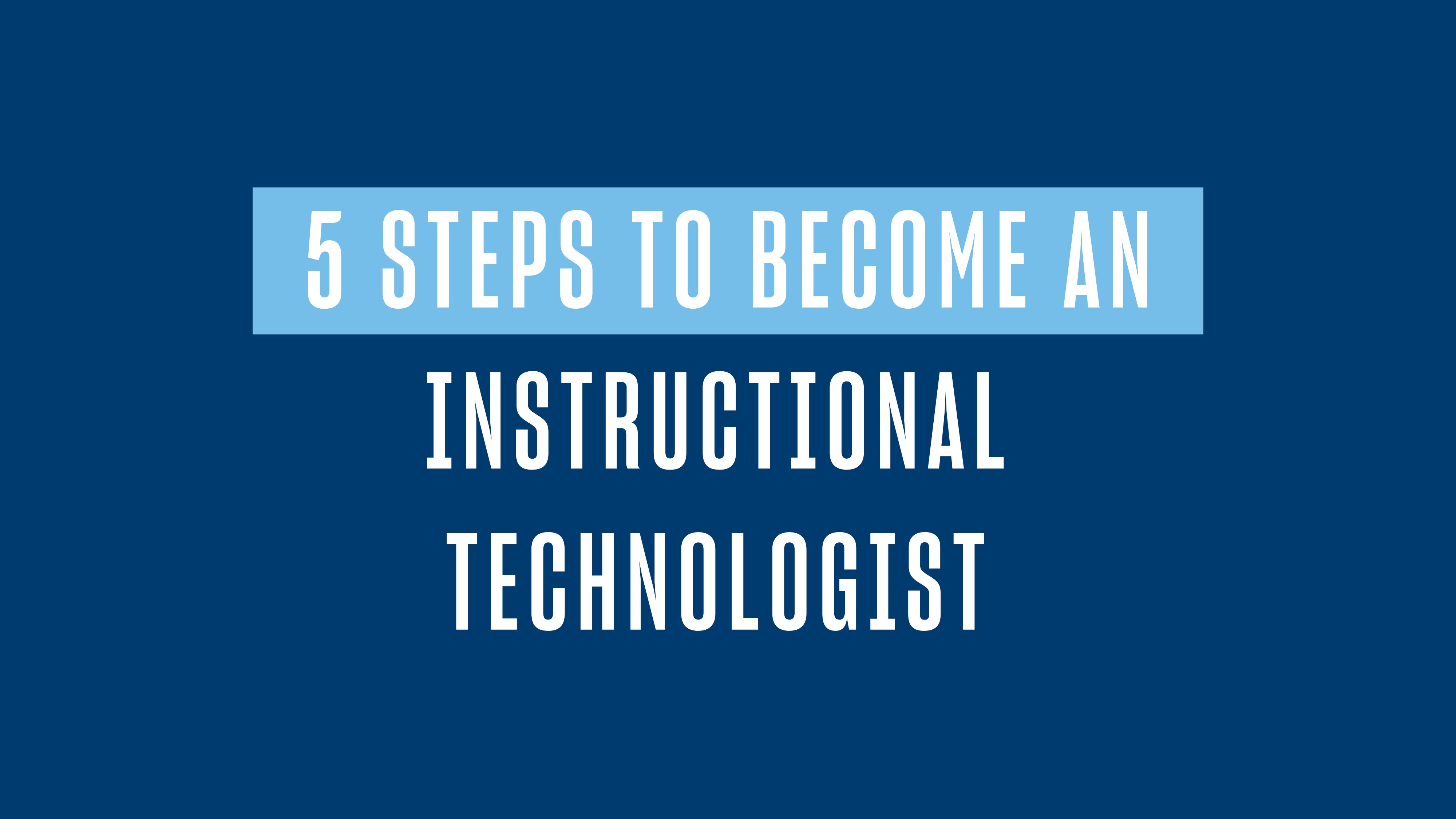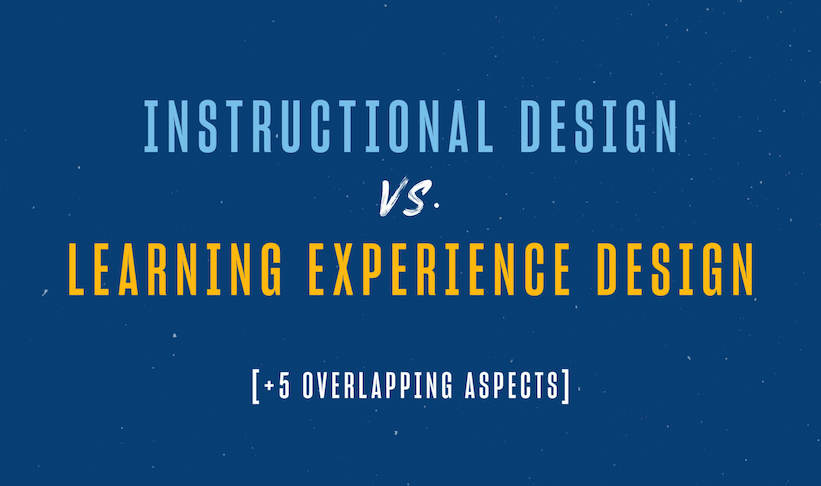In today’s rapidly evolving world of education and training, the role of an instructional technologist has become increasingly crucial. Instructional technologists are the superheroes behind the scenes who ensure that technology is being used to its fullest potential in education and training settings. They combine their problem-solving skills with technological expertise to help create engaging and effective learning experiences for learners of all ages.
Continue reading to learn more about this exciting career field, including primary responsibilities, common job titles, average salaries and the skills you need to succeed as an instructional technologist.
5 Steps to Become an Instructional Technologist
What Is Instructional Technology?
Instructional technology is a multidisciplinary field that combines the principles of instructional design and technology to create impactful, engaging learning experiences. It involves the design, development, implementation and evaluation of technology-based learning environments, tools and resources to enhance the learning process.
At its core, instructional technology seeks to improve the effectiveness of education and training by leveraging the benefits of various technologies. This can include digital tools and resources, such as:
- Communication and collaboration tools
- Virtual reality (VR)
- Microlearning tools
- Learning management systems (LMS)
- Multimedia tools
- Mobile learning
One of the advantages of instructional technology is its ability to facilitate personalized learning. By leveraging technology, instructional designers can create custom learning experiences that cater to learners’ individual needs and preferences. Instructional technologists can then work with instructors to ensure the functionality and feasibility of the technology components.
Instructional technology facilitates the creation of immersive and interactive learning environments. For example, VR technology can simulate real-world scenarios and provide learners with hands-on experiences that would be difficult or impossible to replicate in a traditional classroom setting.
Another advantage of instructional technology is its ability to support distance learning and remote work. With the rise of online education, instructional technology has become an essential tool for facilitating communication and collaboration among learners and trainers in different parts of the world.
What Is an Instructional Technologist?
Instructional technologists focus on integrating technology into learning environments to add educational value and improve learning outcomes. As an instructional technologist, you’ll work with teachers, trainers and subject matter experts to create educational materials that leverage the latest technologies. Your work will range from developing online courses to staying abreast of trends and best practices and recommending innovative learning strategies and technologies. You’ll also maintain and troubleshoot the technology used in the classroom or online.
Instructional Technologist Responsibilities
Instructional technologists are responsible for a wide range of tasks related to the development and implementation of technology-based learning environments and resources. Here are some of the day-to-day responsibilities of an instructional technologist:
- Collaborating with subject matter experts (SMEs), instructors and trainers to identify learning goals and objectives
- Developing instructional materials and resources that use technology to enhance learning, such as interactive eLearning modules, simulations and multimedia presentations
- Selecting and implementing appropriate instructional technologies, including LMS, video conferencing software and VR tools
- Carrying out needs assessments and evaluations to identify areas for improvement in existing learning materials and resources
- Providing technical support to instructors and learners to ensure the proper functioning of instructional technologies
- Staying up-to-date with the latest trends and best practices in instructional technology and incorporating these into instructional design and development processes
For example, an instructional technologist working in higher education might be responsible for creating and setting up online courses that use a learning management system — such as Canvas or Moodle — to deliver course materials, assignments and assessments. They may also collaborate with SMEs to develop interactive multimedia resources, such as videos and simulations that help students grasp complex concepts. Additionally, they may provide tech support to instructors and students to troubleshoot challenges with the LMS or other instructional technology tools.
The day-to-day responsibilities of instructional technologists will vary depending on the industry and context in which they work. However, their overarching goal is always the same: to utilize technology for the purpose of developing engaging learning experiences that help learners achieve their goals.
Instructional Technologist Job Titles and Salaries
Instructional technologists can work in many different industries, from education to healthcare to corporate training. Depending on the specific role and industry, job titles and salaries can vary. Here are some of the potential job titles that someone with a background in instructional technology may hold:
- eLearning Developer — Responsible for developing and implementing eLearning modules and other digital learning resources. They use software and programming languages to create interactive learning experiences that students can access using different devices. According to Glassdoor, the average salary for an eLearning developer is around $79,000 per year.
- Learning Management System Administrator — LMS admins are responsible for managing and maintaining learning management systems that are used to deliver and track online learning materials and activities. Professionals in this role ensure that the LMS is functioning properly, troubleshoot technical issues and provide training and support for instructors and learners. According to Glassdoor, the average salary for an LMS administrator is around $68,000 per year.
- Educational Technology Specialist — A person in this role is responsible for integrating technology into the classroom to improve teaching and learning. Educational technology specialists work with educators to identify technology tools and resources that can support student learning, provide training and support to educators to make sure they’re comfortable using various digital tools and evaluate the effectiveness of educational technology programs. According to Glassdoor, the average salary for an educational technology specialist is around $60,000 per year.
- Instructional Technologist — Those who hold this title are responsible for developing and implementing tech-based learning environments and resources. They work with SMEs, trainers and instructors to identify learning goals and objectives and use instructional design principles to create engaging learning experiences. According to Glassdoor, the average salary for an instructional technologist is around $67,000 per year.
- Corporate Trainer — This type of professional develops and delivers programs to employees on new technologies, products or services. They assess the training needs of employees, design effective learning experiences and evaluate the success of the training. Corporate trainers may work in a variety of industries, from technology to healthcare to finance. According to Glassdoor, the average salary for a corporate trainer is around $70,500.
*All salaries sourced from Glassdoor and are subject to change.
With the growing demand for online education and eLearning solutions, knowledgeable instructional technologists are highly sought after. The average salary for someone working in the instructional technology field in the United States ranges between $65,000 to $75,000 per year, with opportunities for advancement and higher salaries with greater experience and expertise.
Instructional Technologist Skills and Qualifications
To find work as an instructional technologist, you’ll need the right combination of education, skills and experience. Here are some of the key qualifications needed to succeed in this role:
- Education — Most instructional technologist positions require at least a bachelor’s degree in instructional design, education or a related field. Some roles may require a master’s degree or other advanced certification in instructional technology or a related field. The University of San Diego’s online Master of Science in Learning Design and Technology is a 20-month project-based program ideal for educators and professionals involved in training in any capacity.
- Technology skills — Instructional technologists should possess strong technical skills, including experience with learning management systems, authoring tools and multimedia software. They should also be comfortable using digital devices such as smartphones, tablets and laptops.
- Instructional design skills — Those looking to work in this field need to have a strong understanding of instructional design principles to develop impactful learning experiences. This includes understanding how people learn, how to develop clear learning objectives and leveraging technology to craft interactive learning processes.
- Communication skills — To be an effective instructional technologist, you’ll need to have strong communication skills, including the ability to collaborate with SMEs, trainers and instructors to understand their needs and goals. It’s also essential that a person in this role can communicate effectively with learners, both in written and verbal form.
- Project management skills — Being able to plan, execute and manage projects on time and within budget are key skills needed to thrive as an instructional technologist. This includes managing resources, identifying risks and opportunities and working with stakeholders to ensure positive project outcomes.
By developing a solid foundation in instructional design, technology, communication and project management, aspiring instructional technologists can position themselves for success in this growing field.
5 Steps to Become an Instructional Technologist
If you’re interested in becoming an instructional technologist, here are five steps you can take to get started:
- Get the appropriate education —To get a job as an instructional technologist, a bachelor’s degree is encouraged, and an advanced degree may also be preferred in some instances. Look for online or traditional programs that offer courses in instructional design, learning theory, multimedia design and technology integration.
- Gain experience — Seek opportunities to work on instructional design projects, such as developing eLearning modules, creating videos or designing simulations. Consider internships or entry-level positions in instructional design, training or education to gain practical experience in the field.
- Build up your technical skills — Enroll in courses or workshops in the latest authoring tools, learning management systems and multimedia software to be aware of the latest developments in learning design and technology. You may also want to consider earning certifications in specific technologies or software, such as Articulate 360.
- Network with other professionals — Join professional organizations, attend conferences and events and connect with other professionals in the field. Networking can help you keep abreast of the latest trends and technologies and may even lead to future job opportunities.
- Continue learning — Read industry publications and blogs and take courses or earn certifications to stay current with the latest best practices in instructional design and technology.
Follow these five steps to position yourself for a successful career as an instructional technologist. With a solid education, practical experience, technical skills and a commitment to lifelong learning, you can help shape the future of education and training through technology.
Are you interested in pursuing a career in instructional technology? The University of San Diego’s online master’s in Learning Design and Technology program can equip you with the skills needed to excel in this dynamic field. Download our informative guide, 9 Things to Know About Careers in Instructional Design, to learn more.



![What is Learning Experience Design? [+ Career Paths]](https://onlinedegrees.sandiego.edu/wp-content/uploads/2023/06/ldt_blog_learningexperiencedesign-1024x576.png)

